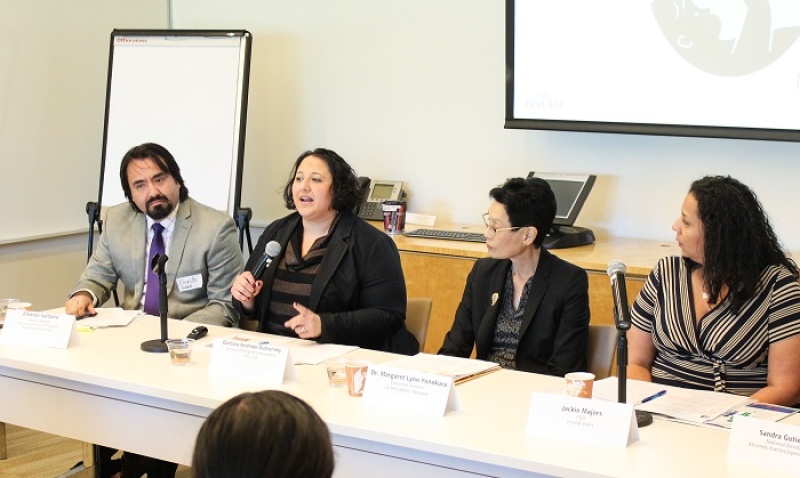

Gesele McGlothin-Muhammad shared how her interactions and relationships with her two sons helped them improve in their learning.
"What is this, Aqil?" Gesele McGlothin-Muhammad asks her youngest son, pointing to the letter 'A' on a pamphlet.
"A," Aqil responds immediately. Aqil is a 1-year-old baby.
"A is his favorite letter," says Gesele with a smile. Her older son Mikal is a 5-year-old who is currently being home schooled on a second-grade level. Her constant interaction with her sons has allowed them to get ahead and learn on a faster pace, she says.
McGlothin-Muhammad's story is one of many that advocates are pointing to as they seek to spread awareness of the need for starting to educate children even before they turn 1. And it's not just preschools that advocates are promoting -- it's education through parental relationships and interactions.
"The parent is the child's first teacher," said Dr. Margaret Lynn Yonekura, the executive director of the L.A. Best Babies Network. Though talking to a baby who is not yet able to respond may be awkward for some parents, Yonekura said, "The more you talk to babies, the more they will learn."
"Early childhood education is the foundation," Ernesto Saldana, the senior advisor on educational policy and programs in The Advancement Project, as he drew a sketch of a house. The other components of the house are like the upper levels of education, including elementary, middle, and high schools. The roof is like higher education, he said.
"What would happen to the house if the foundation isn't there? What would happen to the roof of higher education?" Saldana posed. In order to ensure children are well prepared and are able to follow along the pace of the later levels of education, education at home before children enter kindergarten is just as important, if not even more important, he said.
The emphasis on a parent's influence on a baby's cognitive capability is particularly important given that many parents may not be able to afford sending their childrent o preschool. According to an April 2016 study conducted by the Public Policy Institute of California, 42 percent of California residents said affordability of preschool is a big problem, and 76 percent of adults said the state should fund voluntary preschool programs for all 4-year-olds.
According to Ross Thompson of the University of California, Davis, whose study on early childhood development was published earlier this year, research has also provided evidence of the importance of parental relationships in early childhood learning.
"Relational security promotes the child's confidence and competence at exploration, supports self-regulation, buffers stress, and enables children to learn from the sensitive guidance provided by their caregivers," said Thompson.
"Social interaction is also a forum for the growth of gonitive skills, such as the storybook reading and counting games that provide initial foundations for understanding language and number," he continued. "As children mature, of course, the activites they share with parents that promote learning also evolve: conversations become longer and more complex, items are measured and sorted into groups of specific quantities, and shared problem-solving becomes more dogged and creative."
Parents can find resources to help them engage with their children in various places, including at www.211la.org, which provides information on parenting classes and other resources, and www.talkingisteaching.org, which provides resources in talking, singing, and reading to children.



















